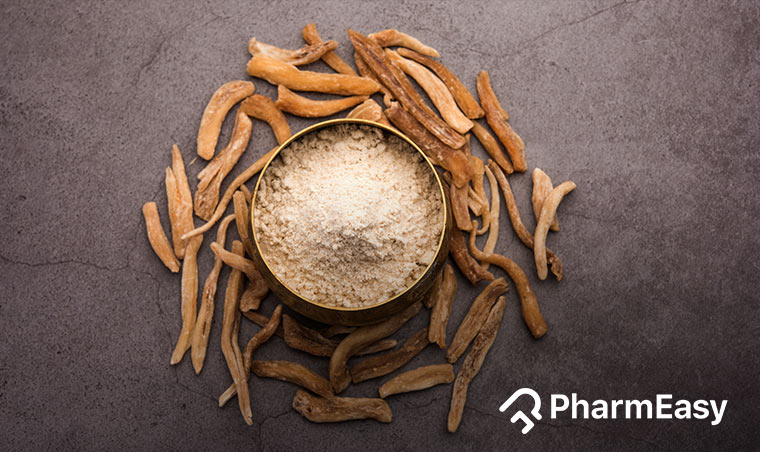Safed Musli: Nutrition, Benefits, Precautions and More!
By Dr Anuja Bodhare +2 more

Get,

to manage your symptom
Get your,


4 Cr+ families
benefitted

OTP sent to 9988776655



You’ve successfully subscribed to receive
doctor-approved tips on
Whatsapp

Get ready to feel your best.

Hi There,
Download the PharmEasy App now!!


Register to Avail the Offer
Send OTPBy continuing, you agree with our Privacy Policy and Terms and Conditions

Hi There,
Sign up on PharmEasy now!!
Trusted by 4 crore+ families

OTP sent to 9988776655



You have unlocked 25% off on medicines




Code: NU25
By Dr Anuja Bodhare +2 more
Table of Contents
The rare Indian herb Chlorophytum borivilianum (Liliaceae) is a famous folk medicine with a long history and medical value. In Hindi, it’s known as ‘Safed Musli’ which means “white tubers” It’s also known as “White gold” or “Divya Aushad” Safed Musli is a widespread species used in Ayurvedic, Unani, Homeopathic, and Allopathic medicine, where the plant’s root plays a key role. It is presently the most economically utilized species1. In the United States and England, tubers are being used to make chips/flakes as a nutritious meal2. In recent years, the demand for this plant has skyrocketed in both the Indian and international medicinal markets, and it may be a crucial ingredient in herbal drug compositions3. The genus Chlorophytum is thought to have originated in tropical and subtropical Africa and was transported to India from South Africa.
Friendly Reminder: The information shared here is for educational purposes only and the reader should consult a registered medical practitioner before implementing any changes to their health routine.

Saponins, flavonoids, alkaloids, steroids, triterpenoids, phenolic acids, Gallo-tannins, vitamins, potassium, magnesium, calcium, rare elements such as zinc, copper, phosphorous, resins, and a high quantity of simple sugars are all found in Safed Musli4. Safed Musli roots contain glucose, protein, fiber, and saponin, alkaloids, saponins, polysaccharides, and protein5. Saponins are found6 in the tubers, which have aphrodisiac, anti-ageing, adaptogenic, health-restorative, and health-promoting qualities.The nutritional value of Safed Musli is given below.
In my opinion, safed musli may have potential benefits for your intimate wellness. One of its special qualities is its aphrodisiac properties, which may be very helpful for men dealing with erectile dysfunction and wanting to enhance their male potency. How? Its richness in glycoside compounds might make it beneficial against impotency17.
Dr. Siddharth Gupta, B.A.M.S, M.D (Ayu)
Safed musli is a rare Indian herb used in Ayurveda, Unani, and homoeopathy, among other traditional medical systems. Safed musli may also have many beneficial properties1.

Safed musli may be a great food to consume for people who are malnourished, emaciated, or underweight and need to gain lean muscle mass due to the presence of beneficial nutrients. Safed musli, may also be used as a dietary supplement, may aid muscular growth by increasing growth hormone level in exercise-trained adults9.

Safed musli has a strong hypoglycaemic effect, which is essential for controlling blood sugar levels in the body. It also contains antioxidants, which may benefit the pancreas against damage. This may aid in the improvement of insulin levels10. However, the data available is insufficient to establish the mentioned benefits of safed museli on blood sugar levels in humans and more studies are needed to further validate these benefits.

Safed musli saponins may show anti-inflammatory and anti-arthritic properties. It may act against inflammatory mediators such as histamine and prostaglandins, which causes pain and inflammation in arthritic patients11. You must consult a doctor for advise on arthritis treatment.

Safed musli may have a significant impact on the body’s overall stamina and energy levels. The powerful components and other herbs utilized in this composition may help alleviate weakness and weariness while boosting the body’s vitality. It may also help to improve the function of the adrenal glands, which helps to lower stress levels and boost immunity13. However, we need to conduct further studies to manifest the effects of safed museli on arthritic conditions in humans.
In my view, safed musli might have magical powers for overall health. It’s known to be an age-defying superhero that may boost lifespan, brain power, and physical strength19.
Dr. Anuja Bodhare, B.A.M.S, M.D (Ayu)

Safed musli may be used for eliminating microbes from the intestines that cause diarrhoea and other intestinal infections due to its potential antibacterial and anti-diarrhoea qualities. It may be used to increase immunity and vigour in diarrhoea and dysentery patients. The powder of the root may significantly reduce the frequency of passing stools while eliminating toxins from the body13.

Because of its potential antistress and adaptogenic properties, safed musli may aid in stress management. It also possesses potential antioxidant properties, which may help to reduce free radicals in the body and lessen the risk of oxidative stress-related illnesses14.

Certain chemicals in safed musli, such as steroidal glycoside, may have anti-cancer properties. If administered early in cancer development, it may also aid in cell apoptosis (cell death) and reduce tumour size and weight12.
Though there are studies that show the benefits of safed musli in various conditions, but these are insufficient and there is a need of further studies to establish the true extent of benefits of safed musli on human health. Every person may respond differently to these herbs. Therefore, it is important to consult a doctor before using safed musli for any medical condition.
Safed musli is available in five different forms16:
You should always consult your Ayurvedic physician before consuming Safed museli regularly. Do not discontinue replace an ongoing treatment with an Ayurvedic/herbal preparation without consulting a doctor as they can guide you about the form and dosage in which the herb can be used as per your health condition.
Although safed musli is considered safe when taken in the recommended therapeutic dosage, taking too much without consulting a doctor can result in the following side effects16:
People with poor digestion or liver diseases should consult a doctor before using safed musli, as this herb is difficult to digest due to its buttery, greasy, and heavy qualities.
While it can help with weight reduction by curbing hunger pangs and keeping the stomach full for extended periods, regular use of large amounts of the powder can lead to a loss of appetite, which can be detrimental to persons trying to gain weight.
Based on my observations, safed musli might be a natural boon for women’s sexual health. It may help with issues like inadequate lubrication, difficulty reaching orgasm, inhibited sexual desire, painful intercourse, vaginal dryness, and reduced blood flow18.
Dr. Smita Barode, B.A.M.S, M.S.
Based on my experience, safed musli might be a superhero for new mothers. It’s considered a potential solution for natal and post-natal problems. In fact, it is even a part of traditional post-delivery diets in the form of delicious laddoos17.
Dr. Rajeev Singh, BAMS
Also Read: Achyranthes Aspera (Chaff Flower): Uses, Benefits & Side Effects
Before using safed musli, seek medical counsel if you have one or more of these problems16.
Also Read: Kumkumadi Tailam: Uses, Benefits, Side Effects and More By Dr. Smita Barode
Also Read: Nutmeg (Jaiphal): Uses, Benefits, Precautions & More!
Safed musli’s botanical name is C. Borivilianum, which belongs to the Liliaceae family. It’s a tropical herb found in peninsular India’s moist woodlands. It may be used for conditions like arthritis, cancer, diabetes, increase vitality and a variety of other ailments1.
Safed musli in the form of churna (powder) or capsule can be consumed15.
When consumed in suitable proportions, safed musli may have no major negative effects. However, excessive use is discouraged because it might induce gastrointestinal problems16.
Safed musli may be utilized for a variety of ailments, including arthritis, cancer, diabetes, enhancing vitality, improving sexual function and more1.
Safed musli powder can be made at home. Take the dried safed musli roots. Then, to form a powder, grind them. Safed musli powder can be consumed with milk or water. This powder can be kept for a long time in an airtight container15.
Safed musli is compatible with milk. You can take safed musli in churna powder form6.
Disclaimer:The information provided here is for educational/awareness purposes only and is not intended to be a substitute for medical treatment by a healthcare professional and should not be relied upon to diagnose or treat any medical condition. The reader should consult a registered medical practitioner to determine the appropriateness of the information and before consuming any medication. PharmEasy does not provide any guarantee or warranty (express or implied) regarding the accuracy, adequacy, completeness, legality, reliability or usefulness of the information; and disclaims any liability arising thereof.
Links and product recommendations in the information provided here are advertisements of third-party products available on the website. PharmEasy does not make any representation on the accuracy or suitability of such products/services. Advertisements do not influence the editorial decisions or content. The information in this blog is subject to change without notice. The authors and administrators reserve the right to modify, add, or remove content without notification. It is your responsibility to review this disclaimer regularly for any changes.
Comments

Leave your comment...
You may also like
Comments